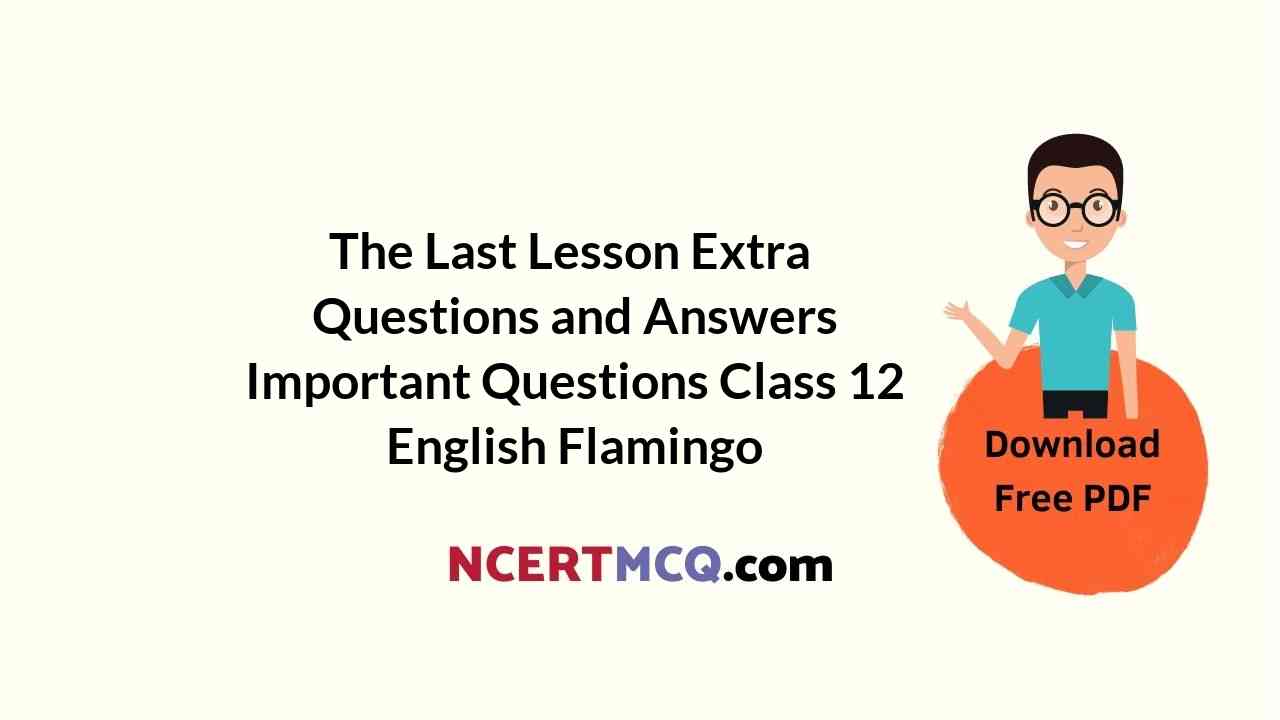Here we are providing Lost Spring Extra Questions and Answers Important Questions Class 12 English Flamingo, Extra Questions for Class 12 English was designed by subject expert teachers. https://ncertmcq.com/extra-questions-for-class-12-english/
Lost Spring Extra Questions and Answers Important Questions Class 12 English Flamingo
Lost Spring Extra Questions and Answers Short Answer Type
Lost Spring Important Questions And Answers Class 12 Question 1.
Who is Saheb? How can you say his name is ironic?
Answer:
Saheb lives at Seemapuri, an area situated at the periphery of Delhi. He is a poor ragpicker. His full name is Saheb-e-Alam. It means lord of the universe. But ironically Saheb is so poor that he can’t even afford buying footwear.
Lost Spring Questions And Answers Class 12 Question 2.
Whom did the author meet every day? Where had that person come from and why?
Answer:
Every day the author met a ragpicker young boy named Saheb, He had come from Bangladesh. There were many storms. These storms swept away their fields and homes. Tliat is why he, along with his parents, left his country
Lost Spring Extract Questions And Answers Class 12 Question 3.
What did Saheb find sometimes in the garbage? What did he do then?
Answer:
Sometimes, Saheb found a rupee or a ten rupee note. When he found a silver coin in a heap of garbage, he ’ didn’t stop scrounging. He always hoped to find more. He had entirely different meaning of garbage.
Lost Spring Extract Questions Class 12 Question 4.
What does the reference to chappals in “Lost Spring” tell us about the economic condition of the rag pickers?
Answer:
The rag pickers of the Seemapuri area , situated at the periphery of Delhi, are living a in very miser-able condition. They lack all the basic facilities of life. They are so poor that they can’t even afford to buy chappals. But to conceal their poverty they say that it is their tradition to walk bare-footed.
Class 12 English Flamingo Chapter 2 Extra Questions Question 5.
What promise did the author make with Saheb? Why had she to feel small?
Answer:
Saheb used to roam here and there. The author ad-vised him to go to school. But he said that there was no school in the neighbourhood. At this the author said that she would start school. But she had made this promise half-jokingly and was not at all serious about it. After a few days Saheb came to her to ask if her school was ready. She had to feel small. She never wanted to start a school. She said that promises like hers are frequently made but hardly ever kept.
Lost Spring Extra Questions Class 12 Question 6.
How does the author describe the area of Seemapuri?
Answer:
Seemapuri is situated at the periphery of Delhi. It is a sort of wilderness. Most of the people living here are Bangladeshi immigrants. They live in structures made of mud, with roofs of tin and tarpaulin, devoid of sewage, drainage or running water. They are about 1000 in number and most of these are rag pickers.
Lost Spring Question Answer Class 12 Question 7.
What was the full name of Saheb? What did it mean? If he came to know the meaning of his meaning what would be his reaction?
Answer:
The full name of Saheb was Saheb-e-Alam. It meant lord of the universe. It would be difficult to believe about the meaning of his name. He was not a lord at all. He was a poor ragpicker.
Lost Spring Question Answers Class 12 Question 8.
Why did the children not wear any footwear? What explanation did they give for it?
Answer:
The children were too poor to afford any footwear. They had become used to roam bare-footed. Different boys gave different reasons for not wearing foot wear. Some admitted that they couldn’t afford them while the others said that it was their tradition to move bare-footed.
Lost Spring Class 12 Question Answers Question 9.
Where have the people living in Seemapuri come from? Why don’t they go back?
Answer:
The people living in Seemapuri have come from Bangladesh. It is a place of green fields. Their land is very beautiful. But it is frequently swept by the storms. They had to starve there. Therefore they immigrated to India and do not want to go back.
Lost Spring Important Questions And Answers Pdf Question 10.
What was Saheb wearing one morning? Where did he get it?
Answer:
Saheb was wearing tennis shoes one morning. They were the discarded shoes of a rich boy. There was a hole in one of the shoes and thus that rich boy discarded it. But for Saheb who always walked bare footed even these shoes were like a dream come true.
The Lost Spring Question Answers Class 12 Question 11.
Where did the author see Saheb one morning? What was he doing there?
Answer:
One winter morning, the author saw Saheb standing by the fence gate of the neighbourhood club, watching young men playing tennis. He would go inside when no one is around. The gatekeeper allowed him to use the swing. But the game which he was watching so intently was beyond his reach.
Lost Spring Short Question Answer Class 12 Question 12.
The author says that Seemapuri is a place on the periphery of Delhi yet miles away from it, metaphorically. What is the meaning of her statement?
Answer:
Seemapuri is situated on the periphery of Delhi. But it is devoid of all basic amenities. Unlike Delhi it is not developed at all. Though it is quite near Delhi, it does not have any effect of the city. Therefore the author is quite right in saying that Seemapuri is a place on the periphery of Delhi yet miles away from it.
Lost Spring Question And Answer Class 12 Question 13.
What does garbage mean for the elders and the children in Seemapuri?
Answer:
Garbage to the elders is gold. It is their daily bread, a roof over their heads, even if it is a leaking roof. But for children, it is something wrapped in wonder.
Lost Spring Class 12 Extract Based Questions Question 14.
Is Saheb happy working at the tea stall? Why/ Why not?
Answer:
Saheb did not feel happy working at the tea stall. Now he is not his own master. He has lost his previous carefree look. He is no longer his own master. He now belongs to the owner of the tea stall.
Lost Spring Extra Question Answers Class 12 Question 15.
Who is Mukesh? What does he want to become and why?
Answer:
Mukesh is a young boy who belongs to a family of the bangle makers in Firozabad. He doesn’t want to adopt his family profession. He wants to become a car mechanic. He has seen that bangle making has given his family nothing but perpetual poverty. Therefore he wants to break away from his family tradition of bangle making.
Question 16.
What makes the city of Firozabad famous?
Answer:
The city of Firozabad is a hub of bangle making. Every other family is engaged in making bangles. Bangles are supplied to every comer of the country.
Question 17.
Under what kind of environment are the children forced to work in the glass blowing industry?
Answer:
There are about 20000 children working in the glass blowing industry. They are forced to work for long hours in very hot temperatures. They have to work sin dingy cells without air and light. They often lose the brightness of their eyes.
Question 18.
What kind of locality does Mukesh live in?
Answer:
Mukesh lives in a very dirty locality. The lanes there are stinking and choked with garbage. The homes in the locality are no better than hovels. Their walls are crumbling, doors are wobbly and there are no windows. There humans and animals live together.
Question 19.
What does the author say about Mukesh’s house?
Answer:
The author says that Mukesh’s house was like a half- built shack. In part of, thatched with dead grass, was a firewood stove. The author saw Mukesh’s sister-in-law cooking food for the whole family.
Question 20.
What is the opinion of Mukesh’s grandmother about her husband?
Answer:
Mukesh’s grandmother says that it is his (her husband’s) destiny that he was born in the family of bangle makers. She calls it a god-given lineage which can’t be broken. This shows that she has accepted her fate silently.
Question 21.
What does the writer say about Savita?
Answer:
Savita was a young girl. When the writer saw her she was wearing pink dress. She was sitting with an elderly woman. She was soldering pieces of glass. But she didn’t know the sanctity of bangles she was weilding.
Question 22.
Why can’t the bangle makers organise themselves into a co-operative?
Answer:
The bangle makers can’t organise themselves into co-operative because they have fallen into a vicious circle of middlemen who had trapped their fathers and forefathers. If they get organised, they are beaten and dragged to jail for doing something wrong.
Question 23.
What is Saheb looking for in the garbage dumps? Where is he and where has he come from?
Answer:
Saheb is looking for a coin or even a ten-rupee note from the garbage dump. He lives in Seemapuri (Delhi). His parents came from Bangladesh in 1971.
Question 24.
What expectations does the author offer for the children not wearing footwear?
Answer:
Most of the rag pickers roam about bare-footed in the streets. These children are so poor that they can’t afford to buy any footwear. But they told the author that it was their tradition to move about bare footed.
Question 25.
Is it Saheb happy working at the tea stall? Explain.
Answer:
Saheb starts working at a tea stall. He is paid 800 rupees per month and he is provided all his meals. Even then Saheb is not happy working at the tea stall. He no longer remains his own master.
Question 26.
What makes the city of Firozabad famous?
Answer:
The city of Firozabad is the centre of India’s glass-blowing industry. In this city almost every family is engaged in making bangles. These bangles are sent to every part of India.
Question 27.
Mention the hazards of working in the glass bangles industry?
Answer:
Working in the glass bangle industry has both mental and physical hazards. Mostly children are engaged in this industry. When they grow up, working in the industry for years, they lose the ability to dream. There are many physical hazards of working in this industry. The children have a very bad effect on their eyes. Their eyes are more adjusted to the dark than light outside. That is why they often end up losing their eyesight before they become adults.
Question 28.
How is Mukesh’s attitude to his situation different from that of his family?
Answer:
Mukesh doesn’t want to adopt his family’s profession of bangle making. This profession has in no way helped them to live a comfortable life. Therefore he has decided to become a car mechanic. He will go to a garage and learn.
Question 29.
What could be some of the reasons for the mi-gration of people from villages to cities?
Answer:
The villagers migrate to the cities because of the economic reasons; They come to cities to find better employment opportunities. In the given text Saheb’s ancestors migrated to Delhi from Bangladesh. Their fields and homes were frequently swept by storms. They had nothing to eat. That’s why they left their beautiful land.
Question 30.
Would you agree that promises made to poor children are rarely kept? Why do you think this happens in the incidents narrated in the text?
Answer:
It is true that promises made to poor children are rarely kept. The narrator, who is an affluent lady, promised Saheb that she would build a school. But she herself admits that she had made this promise half-jokingly. Thus we can well imagine that promises made to poor children are seldom or never kept.
Question 31.
What forces conspire to keep the workers in the bangle industry of Firozabad in poverty?
Answer:
There are many forces that conspire to keep the workers in the bangle industry in perpetual poverty. They are caught in the vicious circle of the sahukars, the middlemen, the policemen, the keepers of law, the bureaucrats and the politicians. The bangle makers are trapped by these forces and they are not allowed to organise themselves and form a co-operative.
Question 32.
How, in your opinion, can Mukesh realise his dream?
Answer:
Mukesh has decided to become a car mechanic. He doesn’t want to adopt his family’s profession. He wants to become a car mechanic. He says that he will go to a garage and learn. The garage is quite far away from his home. But he is firm in determination. “I will walk,” says he.
Question 33.
Why should child labour be eliminated and how?
Answer:
Child labour is a slur on the fair face of our society. It is a very cruel practice. Every child has the right to education. By educating children this evil practice can be stopped. The government has already framed the law that every child between the age of 6 —14 must attend school. However this law is not strictly followed. Social awareness can play a very effective role in this direction.
Lost Spring Extra Questions and Answers Long Answer Type
Question 1.
Where had the rag pickers come from? What value of life had been conveyed through their condition?
Answer:
The rag pickers had come from Dhaka. There they had green fields. But there were many storms that swept away their homes and fields. Therefore they had to leave their country and come to Delhi. In Delhi they are living a very hard life. They are living in Seemapuri, a place at the periphery of Delhi. There they are living in the structures of mud, with roofs of tin and tarpaulin, devoid of sewage, drainage or running water.
The value of life conveyed through their condition is that every government should take care of their people. They should be provided better employment opportunities so that they are not compelled to migrate to other country. In this lesson it been shown that the indifferent attitude of the Bangladeshi government has compelled its citizens to migrate to India.
Question 2.
What does the writer want Saheb to do? She has to feel embarrassed later. Why?
Answer:
Saheb is a rag picker. The writer sees him every morning. One day, the writer advised him to go to school. Saheb told her that there was no school in the neighbourhood. He further said that when one would be constructed, he would definitely go. The writer asked him, half-jokingly, if she started a school would he come.
Saheb replied in affirmative. After some days Saheb came running to her and said to her, “Is your school ready?” the Writer had to feel embarrassed at this because she had made a promise that was not meant.The writer wants to say promises are made to the poor but they are never fulfilled. She shows this fact by giving her own example.
Question 3.
Give a brief account of the life and activities of the people like Saheb-e-Alam settled in Seemapuri.
Answer:
Seemapuri is located on the periphery of Delhi. It is a slum area. About 10,000 people live there. They all are ragpickers and have come from Bangladesh in 1971. They are living in structures of mud, with roofs of tin and tarpaulin, devoid of sewage, drainage or running water. They have lived there for many years without permits but with ration cards that get their names placed on voter lists and enable them to buy grain. Food is more important for survival than an identity.
Wherever they find food they pitch their tents that become their transit homes. They are involved in ragpicking. It has acquired the proportions of a fine art. Garbage to them is gold. It is their daily bread, a roof over their heads, even if it is a leaking roof. For children, garbage is a thing wrapped in wonder. They often scrounge it to find some coins. On the whole we can say that the people living there are living a very hard life.
Question 4.
Where did the writer see Saheb one winter morning? What was he doing? What was he wearing in his feet?
Answer:
The writer saw Saheb standing at the fenced gate of the neighbourhood club, watching two young men dressed in white, playing tennis. Saheb liked tennis but he knew that game was beyond his reach. However he used to go inside when no one was around. The gatekeeper allowed him to use the swing.
The writer saw Saheb wearing tennis shoes . That looked strange over his discoloured shirt and shorts. Someone had given them to Saheb. In fact they were the discarded shoes of some rich boy. He had stopped them wearing because of a hole in one of them. But Saheb who always walked barefoot, even shoes with a hole was a dream come true.
Question 5.
“For the children it is wrapped in wonder, for the elders it is a means of survival.” What kind of life do the ragpickers of Seemapuri lived?
Answer:
The ragpickers lived in the area of Seemapuri located at the periphery of Delhi. Those who live here are the Bangladeshi immigrants. They came here way back in 1971. Seemapuri was then a wilderness. It still is but it is no longer empty. In structures of mud, with roofs of tin and tarpaulin, devoid of sewage, drainage or running water, live 10,000 rag pickers. They have been living here without any identity. They have their names in the voter lists and they have got their ration cards. It enables to buy them grain.
Survival in Seemapuri is ragpicking. For the elders ragpicking is their profession and means of livelihood. But for the children it is even more. For them it is a sort of wonder. They would sometimes get a coin or even a ten-rupee note in the garbage. They consider ragpicking an activity full of fun and excitement.
Question 6.
‘Garbage to them is gold; How do the rag pickers of Seemapuri survive?
Answer:
About 10,000 Bangladeshi immigrants live in the Seemapuri area of Delhi. Seemapuri is located at the periphery of Delhi. It is a wilderness. The rag pickers live in the structures of mud, with roofs of tin and tarpaulin, devoid of sewage, drainage or running water. They have been living here without any identity. They have their names in the voter lists and they have got their ration cards.
It enables to buy them grain. Survival in Seemapuri is ragpicking. They do not know no other profession but rag picking. They left their beautiful land of green fields because there were frequent storms and as a result their houses and fields would swept away due to them. As a result they had to starve. They pitched their tents wherever they find food. They could earn their food only by ragpicking.
Question 7.
What do you know about the city of Firozabad?
Answer:
Firozabad is the centre of,bangle making industry in India. All over in India the bangles are supplied from this city. But there is a dark side of this city also. Firozabad is a very dirty city. Every other family in Firozabad is engaged in making bangles. They have been engaged in this profession for many generations. Even then these people always remain poor. The children are also involved in making bangles. They are forced to work for long hours in very hot temperatures. They have to work in dingy cells without air and light. They often lose the brightness of their eyes.
The bangle makers are caught in the vicious circle of sahukars, the middlemen, the policemen, the keepers of law, the bureaucrats and the politicians. They are beaten and put to jails if they try to organise themselves. Also the bangle makers are very poor. The young men are forced to adopt their elders’ profession. Years of mind-numbing toil have killed all initiative and the ability to dream.In this extract the writer has depicted that picture of Firozabad which perhaps is not known to many other parts of India.
Question 8.
How in your views can Mukesh realise his dream?
Answer:
Mukesh is very different from the other members of his family. All the members of his family have subsided themselves to the profession of bangle making and considered it their destiny. But Mukesh wants to break these shackles of bangle making. He knows that the profession of bangle making has given them nothing but poverty. Therefore he wanted to become a car mechanic.
He hoped to alleviate the poverty of his family in this way. The garage is quite far away from his home. But he is determined to fulfil his dream. He says that he will walk all the way to the garage. This shows that Mukesh is quite a rebellious and determined boy. He wants to break away with his family profession of bangle making.
Question 9.
It is illegal to employ children in the bangle industry. Even then many children are employed in this industry in Firozabad. How?
Answer:
It is illegal to employ children in any industry in India. It is a punishable offence. But it is seen that this law is not followed or rarely followed. The children work for very less wages. They are very submissive and agile. They give almost the same or even more production as compared to adult workers. Therefore most of the factory owners prefer to employ children in their factories.
They are often able to deceive law. The reason is very clear. The vicious circle follows. There are policemen, middlemen, keepers of law, bureaucrats and also politicians. They all are mixed up to keep tender souls in the quagmire of hard labour. They kill all the initiative and zeal of the children. They become so. discouraged that they quietly accept all this a part of their destiny.
Question 10.
The bangle makers of Firozabad make beautiful bangles and make everyone happy but they themselves live and die in squalor. Explain.
Answer:
In Firozabad, almost every family is involved in the business of bangle making. Firozabad is the centre of India’s glass-blowing industry. The families here have spent generations working around furnaces, welding glass, making bangles for all the women in the land. But these bangle makers are very poor. They can’t earn enough to afford even two square of meals.
Even the children are forced to live in dingy cells without air and light. About 20,000 children work in the glass-blowing industry. They are forced to work for very long hours and also in very inhuman conditions. They often lose the brightness of their eyes. The bangle makers live a very miserable life. Though they make everyone happy by making beautiful bangles, they themselves live and die in very deplorable condition.
Lost Spring Extra Questions and Answers Extract Based
Read the following paragraph and answer the questions that follow:
(Para-1)
“It takes longer to build a school,” I say, embarrassed at having made a promise that was not meant. But prom¬ises like mine abound in every comer of his bleak world. After months of knowing him, I ask him his name. “Saheb- e-Alam”, he announces. He does not know what it means. If he knew its meaning lord of the universe he would have a hard time believing it. Unaware of what his name represents, he roams streets with his friends, an army of barefoot boys who appear like the morning birds and disappear at noon. Over the months, I have come to recognise each of them.
Questions :
(a) Why was the narrator embarrassed ?
(b) What was the meaning of the name of Saheb ?
(c) Why with his friends, Saheb roams the streets ?
(d) Name the chapter and the writer.
Answers :
(a) The narrator was embarrassed because she couldn’t fulfil her promise to start a school.
(b) Saheb’s name meant ‘Lord of the universe’.
(c) With his friends, Saheb roams the streets for ragpicking to scrounge for silver coin or some wonderful unex¬pected things.
(d) ‘Lost Spring’ is the chapter written by ‘Anees Jung
(Para-2)
Food is more important for survival than an identity. “If at the end of the day we can feed our families and go to bed without an aching stomach, we would rather live here than in the fields that gave us no grain,” say a group of women in tattered saris when I ask them why they left their beautiful land of green fields and rivers. Wherever they find food, they pitch their tents that become transit homes.
Questions :
(a) ‘Food is more important for survival than an identity’. Explain.
(b) Who said, “If at the end gave us no grain”?
(c) What did the writer ask to a group of women ?
(d) What are ‘transit homes’ ?
Answers:
(a) Food is more important for survival than an identity as for living a life, a person needs food continuously. Identity or any other thing is secondary, more important is food.
(b) A group of women in tattered saris said the aforesaid statement when the narrator asked them about their migration from Dhaka.
(c) The writer asked to group of women why they left their beautiful land of green fields and rivers.
(d) ‘Transit Homes’ are the homes which are not permanently constructed or settled, they are movable and mostly made with light materials as cloth, bamboos or dried grass.
(Para-3)
This morning, Saheb is on his way to the milk booth. In his hand is a steel canister. “I now work in a tea stall down the road,” he says, pointing in the distance. “I am paid 800 rupees and all my meals”. Does he like the job ? I ask, His face, I see, has lost the carefree look. The steel canister seems heavier than the plastic bag he would carry so lightly over his shoulder. The bag was his. The canister belongs to the man owns the tea shop. Saheb is no longer his own master!
Questions :
(a) What is paid to Saheb at tea stall ?
(b) Does Saheb like the job ?
(c) Why steel canister seemed heavier than the plastic ’ bag?
(d) ‘Saheb is no longer his own master !’ Explain.
Answers :
(a) At tea stall, Saheb is paid 800 rupees and ail his meals.
(b) No, Saheb does not like the job. He is a servant now.
(c) Steel canister seemed heavier than the plastic bag because the bag was his whereas the steel canister belonged to the man owned the tea shop.
(d) Saheb is no longer his own master means that now Saheb is working as a servant at tea stall, he has to obey the orders given by the owner of the tea shop. He is a slave now.
(Para-4)
Mukesh’s family is among them. None of them know that it is illigal for children like him to work in the glass furpaces with high temperatures, in dingy cells without air and light; that the law, if enforced, could get him and all those 20,000 children out of the hot furnaces where they slog their daylight hours, often loosing the brightness of their eyes.
Questions :
(a) What is illegal for children according to the writer ?
(b) Where do those children work ?
(c) What do you understand by ‘they slog their daylight hours’ ?
(d) What is the big loss they face working there?
Answers:
(a) According to the writer, it is illegal for children to work in the glass furnaces with high temperature, in dingy cells without air and light.
(b) Those children work in the glass furnaces with high temperature, in dingy cells without air and light.
(c) ‘They slog their daylight hours’ means that the children, during the day time, work very hard sitting there and waste their precious time which should be occupied in studies and various creative activities.
(d) The big loss they (Children) face working there is the loosing of brightness of their eyes.
(Para-5)
“It is his Karam, his destiny”, says Mukesh’s grand-mother, who has watched her own husband go blind with the dust from polishing the glass of bangles. “Can a god- given lineage over be broken ?” She implies born in the caste of bangle makers, they have seen nothing but bangles in the house, in the yard, in every other house, in every other yard, every street in Firozabad.
Questions :
(a) “It is his Karam, his destiny.” Explain.
(b) What does it mean : “Can a god-given lineage ever be broken ?”
(c) What happened to Mukesh’s grandfather ?
(d) What is the scene of Firozabad as per the above given description ?
Answers :
(a) “It is his Karam, his destiny” means that to work in bangle industries is their fate since birth and they have accepted it as natural.
(b) “Can a god-given lineage ever be broken” means that the grandmother in the form of the question declares that the descendency which they have got from their ancestors can never be changed.
(c) Mukesh’s grandfather had gone blind with the dust from polishing the glass of bangles.
(d) In Firozabad in every house, in every yard, in every other house, in every other yard, in even every street—only the bangles and glass prpducts are found and s6en everywhere.
(Para-6)
“Why not organise yourselves into a cooperative ?” I ask a group of young men who have fallen into the vicious circle of middlemen who trapped their fathers and forefathers. “Even if we get organised, we are the ones who will be hauled up by the police, beaten and dragged to jail for doing something illegal.” They say. There is no leader among them, no one who could help them see things differently.
Questions :
(a) What do you understand by a cooperative ?
(b) What is the vicious circle of middlemen ?
(c) Why do they not get organised ?
(d) Why are they unable to see things differently ?
Answers :
(a) A cooperative is an independent association of persons united willingly to work combindly for the same goal.
(b) The vicious circle of middlemen is a never ending domain of middlemen like sahukars, the policemen, the keepers of law, the bureaucrats and the politicians. The sphere made by them can never be broken nor be crossed.
(c) They do not get organised bemuse if they got organised, they were the ones who would be hauled up by the police, beaten and dragged to jail for doing something illegal.
(d) They are unable to see things differently because there is no leader among them, who could help them see things differently for their benefit.
(Para-7)
To do anything else would mean to dare. And daring is not part of his growing up. When I sense a flash of it in Mukesh I am cheered. “I want to be a motor mechanic”, he repeats: He will go to a garage and learn. But the garage is a long way from his home. “I will walk”, he insists, “Do you also dream of flying a plane ?” He is suddenly silent. “No,” he says staring at the ground.
Questions:
(a) Why word ‘dare’ is used here for bangle makers ?
(b) Why did the writer cheer ?
(c) What does Mukesh want to be ?
(d) Why did the writer ask, “Do you also dream of flying a plane ?”
Answers:
(a) Bangle makers are very fearful from the middlemen. To do or think anything else except bangle making is a sign of revolt which was found only in Mukesh.
(b) The waiter cheered finding a flash of daring in Mukesh when he says, “I want to be a motor mechanic”.
(c) Mukesh wants to be a motor mechanic for which he is ready to take any pain as the garage is a long way from his home.
(d) The writer asked, “Do you also dream of flyingn plane” because she wanted to check Mukesh’s dedication and real desire,










